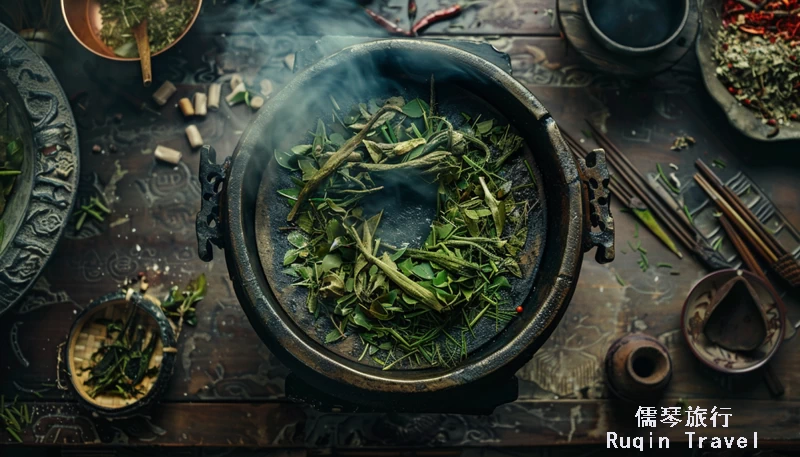Interested in uncovering the secrets of ancient Chinese wellness? Let me introduce you to Chinese Herbal Medicine, a significant component of Traditional Chinese Medicine, or TCM. With a history spanning thousands of years, this practice is rooted in the belief that herbs can harmonize and balance the body.
For foreign tourists visiting China, understanding the secrets of Chinese Herbal Medicine can offer a unique cultural and health-related insight.
The History of Chinese Herbal Medicine
Chinese Herbal Medicine dates back to the Han Dynasty (206 BCE – 220 CE). Ancient texts, such as the “Shennong Bencao Jing” (Shennong’s Classic of Materia Medica), document the medicinal properties of hundreds of herbs. Over centuries, these practices have evolved.
Today, they combine traditional knowledge with modern research. The foundation of Chinese Herbal Medicine lies in balancing the body’s energy, known as “Qi.” It also considers the harmony between Yin and Yang, and the five elements: Wood, Fire, Earth, Metal, and Water.
Fundamental Principles of Chinese Herbal Medicine
Qi, Yin, and Yang
First, understanding Qi is crucial. Qi is the vital energy that flows through the body. It powers physical and mental processes. Yin and Yang represent opposing but complementary forces. Balance between them is essential for health. When Qi, Yin, and Yang are in harmony, the body functions optimally.
The Five Elements
Secondly, the five elements theory is integral. Each element (Wood, Fire, Earth, Metal, Water) corresponds to different body organs and functions. Herbalists use this theory to diagnose and treat imbalances.
Commonly Used Chinese Herbs
When you visit China, you’ll find herbal shops filled with dried roots, flowers, and leaves. Each herb is carefully selected for its unique properties and combined to create remedies tailored to individual needs. From boosting your immune system to relieving stress, these natural treatments cover a wide range of health benefits.
Ginseng
Ginseng is one of the most well-known Chinese herbs. It is renowned for boosting energy and strengthening the immune system. Additionally, it helps combat fatigue and improves cognitive function.
Licorice Root
Licorice root, another staple, harmonizes other herbs in a formula. It soothes the digestive system, reduces inflammation, and has antiviral properties.
Ginger
Ginger is widely used for its warming properties. It aids digestion, alleviates nausea, and helps with respiratory conditions.
Goji Berries
Goji berries are praised for their antioxidant properties. They support eye health, boost immunity, and enhance overall well-being.
Visiting a Chinese Herbal Medicine Store
When visiting a Chinese herbal medicine store, you’ll find an array of dried herbs, roots, and extracts. These stores often have a distinct, earthy aroma. The staff, usually knowledgeable herbalists, can provide guidance on selecting the right herbs. They often prepare personalized herbal formulas based on individual health needs.
Consulting a Herbalist
First, you will have a consultation. The herbalist assesses your health through pulse diagnosis, tongue examination, and discussing symptoms. Next, they prescribe a tailored herbal formula. This custom blend addresses your specific imbalances and health concerns.
Preparing Herbal Remedies
Herbal remedies are typically prepared as teas, powders, or pills. Teas, known as decoctions, are the most common. You boil the prescribed herbs in water to extract their medicinal properties. Powders and pills offer more convenience, especially for those with busy lifestyles.
Learning at a Chinese Herbal Medicine School
For those deeply interested, attending a Chinese herbal medicine school can be enlightening. These schools offer comprehensive courses on TCM theories, herbology, and clinical practices.
You learn to diagnose and treat various conditions using herbal formulas. Furthermore, hands-on training in herbal preparation enhances your practical skills.
Short Courses and Workshops
Many schools also offer short courses and workshops. These programs provide a basic understanding of Chinese herbal medicine. They are perfect for tourists wanting a brief yet informative introduction.
Integrating Chinese Herbal Medicine into Modern Life
Combining Traditional and Modern Approaches
Today, Chinese Herbal Medicine is integrated into modern healthcare. Hospitals and clinics often combine TCM with Western medicine. This approach offers holistic care, addressing both symptoms and underlying causes. For instance, herbal remedies can complement conventional treatments for chronic illnesses, enhancing overall effectiveness.
DIY Herbal Remedies
Additionally, learning to make simple herbal remedies at home can be beneficial. For example, ginger tea is easy to prepare and helps with digestion and colds. Similarly, goji berry smoothies provide a nutritious and health-boosting snack.
Understanding the Benefits and Limitations
Chinese Herbal Medicine offers numerous health benefits. It is particularly effective for chronic conditions, stress, and boosting overall vitality. However, it’s essential to understand its limitations.
Herbal medicine should not replace conventional treatments for severe or acute conditions. Always consult healthcare professionals before starting any new treatment.
Potential Risks and Precautions
Although generally safe, some herbs can interact with medications or cause allergic reactions. Proper consultation with a qualified herbalist ensures safe and effective use of herbs. Additionally, sourcing high-quality herbs from reputable stores is crucial to avoid contaminants.
The secrets of Chinese Herbal Medicine reveal a fascinating blend of history, culture, and health wisdom. Whether you visit a Chinese medicine store, consult a herbalist, or attend a Chinese herbal medicine school, you will gain valuable insights into this ancient practice.
Chinese Herbal Medicine isn’t just about treating symptoms; it’s about restoring harmony and promoting overall health. So, on your trip to China, take the opportunity to explore this fascinating aspect of Chinese culture and discover the natural way to wellness.. Check China Cultural insights for more information.



